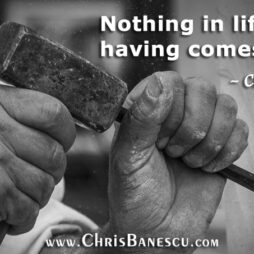 by Chris Banescu –
by Chris Banescu –
Setting personal and professional goals is important. Defining specific, measurable, attainable, realistic, and time-bound goals is smart. Setting meaningful goals is wise. However, an excessive focus on goal-setting without a corresponding change in our daily habits can often lead to failure and disappointment.
Sometimes we focus too much on our goals and ignore the required daily behavioral changes that support those goals. “It sounds counterintuitive, but it’s the truth. Too often we obsess over a big goal, something we desperately want in our life, but are completely unfocused when it comes to the ritual—the recurring steps—that ultimately makes the goal attainable,” observe Mark and Angel Chernoff.
In Getting Back to Happy, the Chernoffs describe learning this lesson the hard way. Many times in their lives they started doing good things with great optimism and determination. Yet, each time they began they quickly got derailed and then gave up. After each failure they berated themselves. “We often felt like losers – that no matter how hard we tried, our goals were out of reach. We’d berate ourselves constantly for not being stronger, smarter, and more disciplined,” they recall.
Focusing on Goals in Ineffective Ways
Eventually, the Chernoffs discovered that “it was never a matter of not having enough strength, intelligence, or discipline.” They were focused on their goals in “an ineffective way.” They spent too much energy on their goals and not enough effort on the daily rituals required to achieve those objectives. Their strong desire for specific results without corresponding focus on necessary daily work had essentially sabotaged their dreams.
I have seen this same pattern repeated in my own life. There have been times when my enthusiasm for certain professional and personal goals were not combined with the proper focus on critical rituals and a corresponding change in daily habits. Worthwhile endeavors were started without effective follow-through or consistent progress.
Like the Chernoffs, each failure lead to discouragement and disappointment. I believed something was wrong with me. I blamed myself for lacking proper motivation and ability. I wasn’t strong enough or sufficiently disciplined to get it done.
Back in 2005, inspired by several moving testimonials and encouragement from graduate students in my classes, I decided to write a book to help others. Despite my passion and determination, and repeated reminders from other students to “write your book,” I was unsuccessful. I spent the next 13 years starting and stopping the project more than half a dozen times. I could not figure out how to complete the book.
Daily Habits Must Reinforce Your Goal
Then, I read Getting Back to Happy and realized what had to change. The remark “nothing will change unless you make a daily ritual that reinforces your goal” hit home. That was my problem! Inspiration and willpower alone were insufficient. I understood that my intense focus on specific goals—without simultaneous passion for practical routines and daily rituals needed to achieve them—had undermined my efforts to write my book. I had to get busy writing and not spend so much energy thinking about completing the book. I shifted my focus from “publish a book” to “write daily.” I stopped thinking of publishing and focused on developing a daily writing ritual. I began writing every single day on anything that interested me.
After several weeks of writing every day on different topics, I returned to the book project. In between writing other material I began working on individual chapters. I stayed focused on writing each day and didn’t beat myself up if I didn’t work on specific book chapters. I continued doing this until one day I realized that I was almost done with the book. I could see the finish line. Just a few more chapters and my book was complete. I had reached the summit by staying focused solely on my next step. The Chernoffs’ advice worked.
Within two months after that day, I had finished and published Pursue Your Freedom and Happiness. It had taken me 24 months to complete what I couldn’t accomplish in the previous 13 years despite my fervor and resolve. I also created more material for a few more books. All those hours of writing for months on end, had helped me produce dozens of pages of additional ideas and topics to develop further.
How to Shift Your Focus Toward Good Rituals
How should you “shift your focus away from your goals and toward the rituals that support them,” as the Chernoffs advise? The solution is in understanding the difference between a goal and a ritual. Here are some examples derived from their book:
- If you want to get fit, your goals are to lose weight and build muscle strength. Your rituals are daily healthy eating, physical exercises, and/or gym workouts that strengthen your muscles and improve your endurance and stamina.
- If you want to get better educated, your goals are to continuously learn or earn a university degree. Your rituals are reading, studying, learning, and putting concepts into practice each day to help you understand and master important principles and knowledge.
- If you want to be an author, your goal is to publish books. Your rituals are to write, research, and edit written work each day on any topic you’re passionate about; not just material for your books. Your daily habits should involve writing in all forms: blog posts, articles, essays, book reviews, and even substantive comments on social media, occasionally (when appropriate).
- If you want to be a better parent, your goals are to be a good mentor and role model to your child. Your rituals are the effort, hard work, time, and energy you dedicate to be there for your child, set a good example, and provide proper guidance and discipline each and every day.
Push Past Your Wall
As you refocus on building good rituals, be careful. You may encounter multiple instances of uncertainty, hardship, physical pain, psychological discomfort, and even anguish—especially if you haven’t genuinely tried it before and are unaccustomed with the process. Like long-distance runners and triathletes, you will “hit the wall” and be tempted to give up. Don’t! You have to push through. The great stuff happens after you’ve conquered “the wall.”
Once you’re past the initial discomfort and aches, things will get better. Your body and mind will adjust to the challenges and it will get easier. You will begin to reap the benefits of your hard work and commitment. Your “pain and suffering” will be transformed into strength and confidence. And then, you will experience happiness.
Remember to enjoy the journey. There are benefits in this struggle. Oftentimes the daily efforts dedicated to pursuing meaningful goals provide us with as much happiness as achieving our aims. You’ll find joy in practicing healthy rituals and doing good work, each and every day.
(Photo credit Pixabay)



